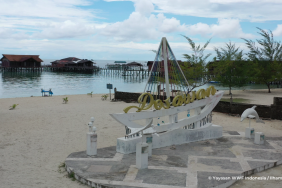ASSESSING PROGRESS IN IMPROVING INDONESIA'S TUNA FISHERIES TO MAINTAIN FOOD SECURITY
On 11-12 May 2015, WWF-Indonesia in collaboration with the Directorate of Foreign Marketing of the Ministry of Maritime Affairs and Fisheries (Dir. PLN-KKP), organized a workshop entitled "Development of Improvement of Indonesian Tuna Fisheries Management to Achieve MSC Ecolabel Certification Standard" in Bogor. From this workshop, it was concluded that improvements to tuna fisheries in Indonesia have been made in the field. However, of the 50 recommended proposals, only 19 steps (milestones) are considered feasible and in accordance with the Marine Stewardship Council (MSC) standard, as of 2014. The other 31 milestones still need to be improved and better managed.
Assessments using the MSC standard for tuna fisheries improvement in Indonesia are applied to tuna - Yellowfin (Thunnus albacares), Bigeye (Thunnus obesus), and Skipjack (Katsuwonus pelamis) - caught using longline, huhate, tuna longline, tonda, purse seine > 30 GT, purse seine < 30 GT, and drift gillnets. The assessment, which began in 2010, resulted in guiding action steps referred to as the Fisheries Improvement Program (FIP).
The implementation of tuna FIP in Indonesia aims to make national tuna production able to compete in the international fisheries market and can increase foreign exchange for the State. This quality improvement will certainly provide benefits to Indonesian fishermen for business continuity and economic added value for livelihood.
Met during the event, Director General of Fisheries Product Processing and Marketing (Director General of P2HP) Saut Hutagalung said, "To fulfill one of the milestones of tuna FIP in Indonesia, in 2014, KKP has developed a Fisheries Management Plan - Tuna, Skipjack, Tongkol (RPP-TCT). In addition to efforts to reduce Illegal, Unregulated, Unreported (IUU) activities, the issue of sustainability is also a priority for KKP." This statement reinforces a comprehensive collaborative effort between the government and organizations assisting the improvement of tuna fisheries in the field, in order to accelerate the achievement of improvement steps towards MSC standard sustainable fisheries.
Indonesia has an obligation to continue to improve capacity and governance in the management of its tuna fisheries, especially with Indonesia's membership in the Western and Central Pacific Fisheries Commission (WCPFC), the Commission for the Conservation of Southern Bluefin Tuna (CCSBT) and the Indian Ocean Tuna Commission (IOTC). Although the RPP-TCT has not yet been formalized, the development of the Harvest Control Rule - Harvest Strategy method should be established immediately, and becoming a compliant member of each Regional Fisheries Management Organization (RFMO) is a homework to be done together.
WWF-Indonesia is assisting tuna FIPs for longline gear in East Java, NTT and Southeast Sulawesi; huhate gear in NTT; tuna longline gear in Jakarta, Bali and North Sulawesi. Indonesian Community and Fisheries Foundation conducted similar activities in Ambon, Maluku for hand line gear. Meanwhile, the International Pole and Line Foundation (IPNLF) is specifically working to assist the improvement activities of the Skipjack fishery using huhate.
The workshop "Progress on Improving Indonesian Tuna Fisheries Management to Achieve the MSC Ecolabel Certification Standard" was also attended by several institutions that work together to improve tuna fisheries practices in Indonesia. These institutions include the Indonesian Tuna Longline Association (ATLI); the Indonesian Pole and Line and Handline Fisheries Association (AP2HI); Sea Delight, a member company of Seafood Savers; NGOs such as the Indonesian Community and Fisheries Foundation, the International Pole and Line Foundation (IPNLF) and the Sustainable Fisheries Partnership (SFP).
Author: Capture Fisheries Team - WWF Indonesia




